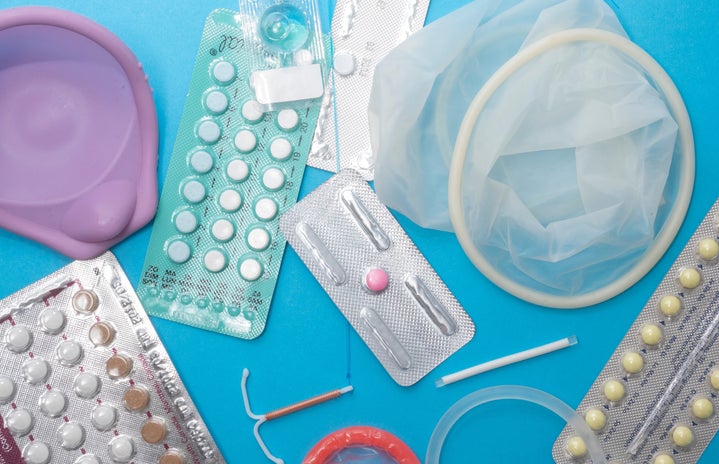“Sex baby, let’s talk about you and me… let’s talk about sex.”
Okay, I get it. Are you also cringing? Me too! I still get uncomfortable watching sex scenes in movies and or TV shows. My internal brown-ness makes all topics related to sex extremely awkward. I mean, just ask my friends who watch “Euphoria” with me! You’ll find me skimming through what I deem “uncomfy” scenes.
As a brown Indian girl, the topic of sex is extremely taboo. I grew up with parents slapping their hands over my eyes when anything remotely romantic (i.e. sniffing an actress’s neck…SRK, don’t worry, I still love you) would show up in Bollywood movies. But, I promise, this isn’t some article about my newfound understanding and epiphany about sex. I just want to make the sex talk, in terms of sexual health, less stigmatized and more common.
To begin, I’m even a little scared to be writing this article. Are people going to judge me, and will this backfire? Who knows? But if I can be vulnerable and push out of my comfort zone to write about this, I’m hoping you, as a reader, will be able to read this article with an open mind.
Today, I believe it is imperative that we discuss sex and sexual health. I’m not going in depth about the birds and the bees, but, I want to stress the importance of sexual education and how the lack thereofis causing immensely high sexually transmitted diseases (STDs) rates in the country, specifically in St. Louis.
“So, let’s talk about sex.”
Well, more like STDs…
According to the Office of Disease Prevention and Health Promotion, 50% of new STD infections that occur each year are among people ages 15 to 24.
Honestly, that’s kind of shocking. Oftentimes, people don’t realize the prevalence of STDs among young people. STDs are very common, and millions of Americans are infected each year. Most commonly, STDs can be passed on from person to person through sexual activity or intimate physical contact. STDs may be difficult to detect as they often have mild to no symptoms, so many do not know that they are infected. They are very preventable, but there are few efficient measures put into place. Due to the vast pool of information online and on social media, adolescents are exposed to different information in terms of sexual health. Many teens gain their knowledge through these platforms, but oftentimes misinformation is spread.
So, how do we combat this and increase sexual education?
Why, thanks, for asking!
The first change to address is at the root of the problem, which is to change the structure of how the United States views STDs and sexual health. The United States does not give STDs the importance that it demands. A colloquial way to combat this widespread problem amongst adolescents is through sex education. Unfortunately, the solution to this issue is not that simple, as sex education in the United States currently is not efficient nor effective. We should provide better education to adolescents.
Through extensive research, I learned that the current curriculum taught in most schools affects the high rates of STDs. The curriculum is not doing enough and in fact, most private and Catholic schools don’t even have sexual education integrated in their coursework. In order to make a better model and adjust our current education system, we ought to create the best education for adolescents with a curriculum for health education based on behavioral change. Through behavioral change education, educators may potentially use strategies that promote self-management hoping to change the behavior of the students. Furthermore, educators can refer people to places that would provide them with contraceptives such as Planned Parenthood.
Another issue to address in terms of sexual health is the unequal access to contraceptives. Those with lower incomes might not have access to contraceptives, causing them to have higher rates of STDs. These individuals are less likely to use contraceptives, as they either do not have the means to or equal access to receive and use them.
In addition to a lack of resources, there is a stigma surrounding the use of contraceptives, so much so that certain religious cultures shun the use of contraceptives altogether. Social pressure often prevents individuals from using contraceptives. For example, in some cultures, contraception is only allowed to be used after a first child is born. Adolescents also may have common misconceptions in terms about the immediate and long term effects of contraceptives, specifically for women.
As a society, there should be a push to first work to normalize and break down the taboo surrounding the use of contraceptives to allow individuals to feel comfortable using them. After all, contraceptives help prevent and decrease the risk of STDs. Healthcare personnel should make contraceptives such as condoms and or birth control more accessible for those of lower socioeconomic classes. Additionally, through public policies and education, preventative measures can be implemented and taught when providing adolescents with sex education. If adolescents are provided with a sexual education and how it can help prevent STDs, they are more likely to use contraceptives in the future. Change can come about through both legislation and breaking the stigma associated with STDs.
Most importantly, as individuals, we should have the ability to embrace and enjoy our sexuality, which is an important part of our physical and mental health. Together, we need to understand that sexuality is a natural part of life and entails much more than sexual behavior. We should be respectful of the sexual rights we all share, and we need to increase open communication about this topic. I get, I really do. I’m not even sure if I will share this article virtually just because it truly does make me uncomfortable to an extent. But I would rather say I was able to understand and conquer this uncomfortable topic. After all, what does it say about students or educators in health care if we are not able to openly discuss something that is a large part of what makes us human?
I’ll leave you with this: be more open to understanding and please actually have the talk with your kids, in the near future or now. Sexual health and education is an ever pressing issue, and we, as educators, students, and healthcare workers need to work together in community to improve sexual health for everyone — no matter their socioeconomic status, religion or sexual orientation.
Bring SEXy back into the conversation, and all parties involved will be more informed and safe.


